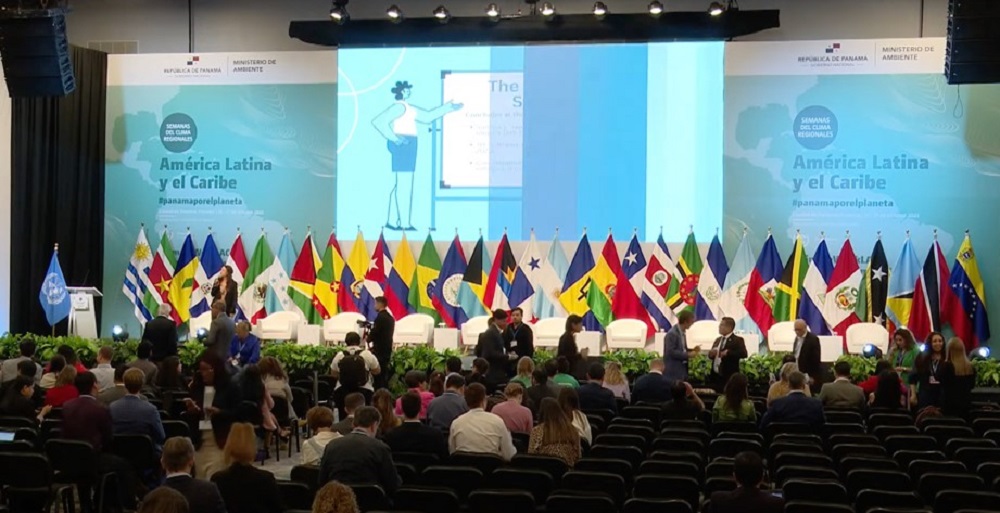Media Release | Border Officials Receive Advanced Training to Support Cross Border Movement in Disaster Scenarios

Tuesday, July 20, 2021 — The Organisation of Eastern Caribbean States (OECS) in collaboration with the Caribbean Community Implementing Agency for Crime and Security (CARICOM IMPACS), the German Development Cooperation (GIZ), the International Organisation for Migration (IOM), the Platform on Disaster Displacement (PDD) and the United Nations High Commission for Refugees (UNHCR) developed and successfully completed a virtual train the trainer (ToT) programme.
The virtual ToT programme was conducted during the month of June 2021 using the CARICOM IMPACS CBSI-Connect learning management platform. The virtual ToT programme forms part of phase II of the capacity building efforts among Border officials to address cross border movement in disaster scenarios. In June 2020, the first virtual training programme was completed with participation from over 160 border officials across nine OECS Member States. The virtual ToT programme provided an opportunity for capacity building in cross border movement for approximately 40 senior border officials among OECS and CARICOM Member States.
Through the ToT programme border officials have gained knowledge on cross border displacement issues and are better positioned to support the training of their peers at the national level. In the first thematic area for the ToT programme border officials examined the nature of disaster displacement in the Caribbean Region – learning from the experiences of recent natural disasters such as the 2017 hurricane season and the La Soufriere volcanic eruption in Saint Vincent and the Grenadines in April 2021 and the roles of relevant actors and regional architecture including the OECS and CARICOM free movement frameworks. Border officials also benefited from a virtual tour of the conditions created by the recent La Soufriere volcanic eruption. During the second thematic area of the ToT programme, border officials were introduced to techniques that will enhance their capacity to identify persons entering the border under disaster scenarios requiring psychosocial support. The third and final thematic area provided border officials with tools and knowledge to better understand mixed migration flows and international protection frameworks in the context of disaster scenarios.
Dr. Clarence Henry, Senior Technical Officer in the Regional Integration Unit of the OECS Commission emphasized the value of the training highlighting that
“the fundamental way towards ensuring that our countries are prepared to effectively support citizens and residents of neighbouring countries in distress is through developing effective programmes to support frontline agencies”.
Mr. Rufus Ferdinand, Chief Operations Officer, Joint Regional Communications Center (JRCC), CARICOM IMPACS, also emphasized the value of the training programme asserting that
“we have seen the value of training key government officials, law enforcement and border security personnel in areas related to mixed migration, inevitably these training programmes will assist in developing skills and competencies at all levels.”
In her closing remarks, Dr Annett Fleischer, Advisor for the Global Programme Human Mobility in the Context of Climate Change at the German Development Cooperation (GIZ) (based in Saint Lucia) took the opportunity to thank participants and provided commitments to future support. Dr. Fleischer stated
“On behalf of GIZ, I would like to thank all participants for their active involvement and valuable contributions in the various interactive sessions including group discussions, role plays, quizzes etc. Be assured that GIZ will continue to support capacity building measures for the OECS Commission and its Member States.”
Mr. Pablo Escribano, Regional Thematic Specialist, IOM, assured participants that
“Capacity building is an essential component of IOM’s interventions around the migration, environment and climate change nexus. The training responds to the needs identified by border agencies and complements other activities focused on the availability of data on environmental migration and the development of regional frameworks.”
Mr. Juan Carlos Mendez Barquero of the Platform for Disaster Displacement reflecting on the training exercise noted that
“the training provided an opportunity for immigration officers to reinforce learning and it aimed to enhance the response to the different challenges of cross border displacement in the context of disasters across the Caribbean region.”
Ms. Rana G. Ksaifi, Head of the Caribbean Protection Unit, UNHCR, in speaking on the importance of the training programme noted that
“UNHCR continues to be present and available to Governments in the Caribbean to provide support with regards to persons in need of international protection amongst the different mixed migrations that the region witnesses. Such capacity-building initiatives have a tremendous added value both for participants and the international community in sharing knowledge and continuing to shed a spotlight on the different needs in the Caribbean. Jointly, we can continue to work together to attract further solidarity for the region to adequately address the needs of refugees, stateless individuals and those displaced by climate change and natural disasters.”
Through the ToT programme, senior border officials in the OECS and CARICOM Member States are better positioned to lead training programmes for their peers in the three thematic areas covered by the ToT programme. To facilitate the national training programme that will be implemented later this year participants received a training manual which provides guidance on teaching pedagogy, tools, techniques and activities that can be undertaken to transfer knowledge on the key thematic areas taught during the ToT programme.
This Media Release was first published on the OECS website
Useful Links
Read more about the work of PDD (in Spanish)
 Loading...
Loading...
Learn more about PDD’s work in our Workplan 2019-2022:
